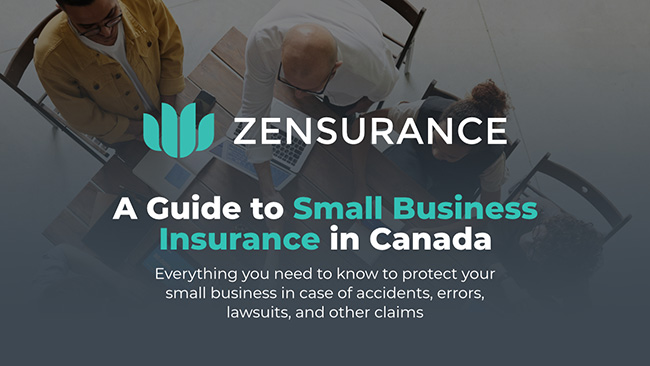Women entrepreneurs and business owners know that one key to success is investing in liability insurance to safeguard their finances, instill confidence in their customers, and prepare to adapt to the ever-changing business landscape.
However, with the right guidance and knowledge, navigating the complexities of acquiring the right type of liability insurance can be a manageable task for any entrepreneur in any industry.
Here are 10 tips for women entrepreneurs and independent professionals to consider when investing in business insurance:

Download Our FREE Insurance Guide
Learn everything you need to protect your small business.
Whitepaper download
"*" indicates required fields
Your email address will be used by Zensurance to provide latest news, offers and tips.
You can unsubscribe at any time.

1. Know Your Business’s Risks
Start by thinking about your business or startup, the products or services you offer, the industry, and the risks it involves. For instance, do you provide professional services or create and sell products or food? While many types of insurance are similar and applicable to different entities, each addresses a different liability concern.
2. Get Customized Coverage
It’s not a question of buying any liability insurance but the type that suits your business and industry. That’s why getting a policy that’s tailored to meet your specific requirements matters. You don’t shouldn’t pay for coverages you don’t need. A customized policy only includes what you need and can save you money.
3. Understand General Liability Insurance
General liability insurance is typically required by all businesses regardless of what they do or provide. This type of insurance exists to cover bodily injuries and property damages to third parties caused by your business’s operations. For example, if a customer or delivery person visiting your commercial property trips, falls, and is injured, you may be liable to pay for their medical and rehabilitation expenses.
4. Don’t Overlook Professional Liability Insurance
If you provide your customers with advice or professional services (e.g., accounting, bookkeeping, consulting), you should have professional liability insurance in your policy. Also called errors and omissions (E&O) insurance, it covers claims against you alleging professional negligence or mistakes and omissions in your work that cause a customer financial or reputational harm.
5. Think About Product Liability Insurance
You need product liability insurance if you sell products or food, whether online or offline. Every business owner that sells goods is liable for any product they manufacture, distribute, or sell. Product liability insurance covers you for dealing with third-party bodily injury or third-party property damage claims caused by a product you sold.
6. Get Cyber Insurance
The online world is rife with cybercriminals constantly seeking ways to hack into your systems and steal data or money. Contrary to popular belief, independent professionals and small businesses are at the top of a hacker’s list because they assume small businesses and startups have fewer cybersecurity resources and defences to stop them.
In addition to investing in cybersecurity tools and following cybersecurity best practices, purchasing cyber insurance to help your business recover from a cyber-attack or data breach is essential. There are two types of cyber insurance to consider: cyber liability insurance and cybercrime insurance.
Cyber liability insurance covers your legal and financial responsibilities following a cyber-attack or data breach, like lawsuits against you and regulatory fines.
Cybercrime insurance specifically covers criminal activities that occur via the internet or other computer networks to address online financial theft and fraud committed against your business.
7. WFH? Get Home-Based Business Insurance
If you don’t have a primary business property where you operate but instead run your business out of your home or condo, you should consider home-based business insurance.
Many entrepreneurs who run their businesses from home might assume their homeowner or personal condo insurance policy automatically covers their business operations, but it doesn’t. You need a separate liability insurance policy to protect a home-based business from liability claims like customer injuries or allegations of professional negligence.
8. Emphasize Coverage Over Price
On one hand, you don’t want to pay more than you need to for the customized liability coverage you need. On the other hand, focusing solely on buying the cheapest coverage available may not suit your needs if you need to file a claim.
Instead, focus on the types of coverage your policy should have and the coverage limits. Here’s why: let’s say you must file a claim because a fire destroyed your office, business contents, and inventory. You have commercial property insurance in your policy (it covers damages and losses caused by fire, water, natural disasters, theft, and vandalism), but you chose a low coverage limit of $500,000 to keep the premium low. If the fire damage to your business is $1 million to fix or replace what you’ve lost, you’ll need to come up with half a million dollars on your own to cover the balance.
9. Partner With an Insurance Broker
When exploring your options for business insurance, you’ll likely have many questions about what you need and don’t need, how much coverage you should have, and what the exclusions in your policy are.
A licensed insurance broker can clear the air for you. Not only will they shop for the most affordable and comprehensive policy they can find from multiple insurers on your behalf based on your actual needs, but they’ll answer your questions and explain to you in plain language what your policy covers and what it doesn’t. Furthermore, if you need to file a claim, your broker will help file your claim with your insurer and see that it is addressed quickly.
10. Review and Update Your Policy Annually
No small business stays the same forever. Businesses change and evolve. They add new services and products, acquire more customers, grow their revenues, purchase new equipment, or move to new locations.
That makes reviewing and updating your liability insurance annually necessary so it continues to adequately reflect the risks you face as your business grows. Don’t fall into the habit of “auto-renewing” your insurance without considering how your company has grown and changed. Your Zensurance broker can help you do that too!
How to Get Low-Cost Liability Insurance Quickly
Zensurance helps thousands of women entrepreneurs and business owners across Canada get the business insurance coverage they need. We’re in the business of keeping small businesses in business.
Fill out our online application for a free quote in less than five minutes.
Our team of experienced insurance brokers will shop our partner network of over 50 insurers to get the low-cost policy you need and customize it to suit your requirements.
Recent Posts
Is Your Salon Ready for the Holidays? Insurance Tips for Beauticians
Salon owners and independent beauticians need to stock up on the products they need to make their clients shine over the holidays. But ensuring they're adequately covered with customized insurance is also critical. Here's what to know.
10 Tips for Closing Your Small Business for the Winter
Are you closing up shop for the winter? Ensuring your property is prepared for winter and your valuable contents and inventory are safely stored is vital. See our tips for how small business owners can shut down operations and keep their assets safe.
Insurance Considerations for E-Commerce Businesses During the Holidays
With the busiest shopping season of the year underway, online retailers and e-commerce businesses need to be vigilant to prevent data breaches and cyber-attacks and get coverage for customer injuries. Here’s how insurance can help.
Sign Up for ZenMail
"*" indicates required fields








